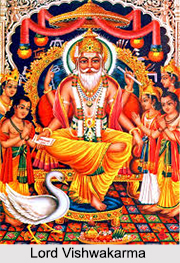 Lord Vishwakarma is the divine architect of the whole universe according to the Rig Veda. He is the personification of the creative power that welds heaven and earth together. He is the son of Lord Brahma. It is believed that Lord Vishwakarma is the official craftsmen of the palaces of all Gods and Goddesses and is also the designer of all the flying chariots and the weapons of Gods and Goddesses.
Lord Vishwakarma is the divine architect of the whole universe according to the Rig Veda. He is the personification of the creative power that welds heaven and earth together. He is the son of Lord Brahma. It is believed that Lord Vishwakarma is the official craftsmen of the palaces of all Gods and Goddesses and is also the designer of all the flying chariots and the weapons of Gods and Goddesses.
Appearance of Lord Vishwakarma
He is painted white, has a club in his right hand, wears a crown, a necklace of gold, and rings on his wrists and holds tools in his left hand. The four hands of Vishwakarma bear a water-pot, a book, a noose and craftsman`s tools respectively. He is the revealer of the science of mechanics and architecture, which is called Sthapatya Veda. Mahabharata describes him as "The Lord of the arts, executor of a thousand handicrafts, the carpenter of the Gods, the most eminent of artisans, the fashioner of all the ornaments, on whose craft all menu subsist, and who is worshipped by all." He is the presiding deity of all the craftsmen and architects.
Vedic Description of Lord Vishwakarma
In the Rig Veda Lord Vishwakarma is described as the God with multi-dimensional vision and supreme strength. It is said that the lord is able to predict in which direction his creation will move. He is credited with the creation of the arms which were used in the mythological era. For instance Vajra used by Indra was made by Lord Vishwakarma by using the bones of sage Dadhichi. The lord is regarded as the supreme worker and the epitome of quality and excellence.
According to the Mahabharata and Harivamsha it is believed that Vishwakarma is the son of Vasu Prabhasa and Yoga Siddha. The account given by Puranas says that Vishwakarma was the son of Vastu and the father of Barhishmati and Sanjna. In Ramayana it has been said that Vishwakarma was the builder of Lanka. It was Vishwakarma who had created the ape Nala who had built the bridge of Lord Rama from the continent to the island.
Mythologies associated with Lord Vishwakarma
There are various legends associated with the accomplishments of Lord Vishwakarma. It is believed that it was Vishwakarma who had created the triloka. In the Satya Yuga he had built the Swargoloka, in the Treta Yuga he had made Lanka and in the Dwapar Yuga he had made the city of Dwarka. Legends also say that even the cities of Hastinapur and Indraprastha were made by Lord Vishwakarma in the Kali Yuga. Even there is a belief that the Jagannath Temple of Puri had also been made by Lord Vishwakarma.
Vishwakarma Puja
Vishwakarma Puja is celebrated on the Kanya Sankranti Day in the month of September. The Puja is a festival that is generally celebrated in all industrial houses, factories, by the craftsmen and weavers. Generally in West Bengal and Assam Vishwakarma Puja is celebrated on 17th of September every year.









